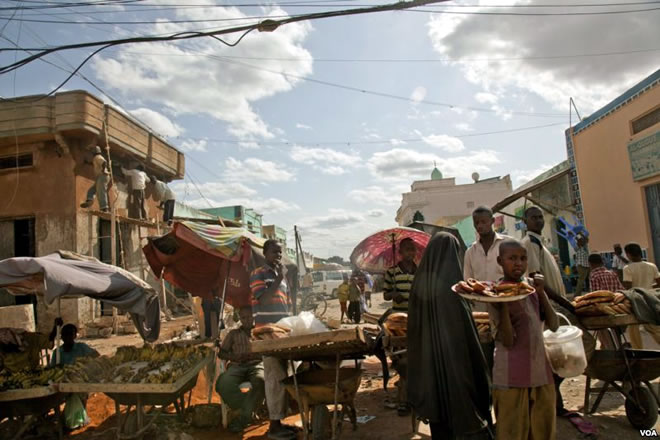
Ethiopian forces cleared Baidoa town of al-Shabaab militants in February of this year, August 24, 2012
Roopa Gogineni
Saturday, August 25, 2012
Sangaba Sheikh is a mother of ten. For the past 20 years she has sold miraa, a plant narcotic popular in Somalia, in the community of Baidoa. These days, business is slow.
“Miraa is very expensive and people are not able to buy because people do not have any income," she said. "We are hungry because we are not getting any money from business.”
Before February of this year, Baidoa was under the control of al-Shabab. The Islamist militants drove the miraa trade underground. Since the Ethiopians liberated Baidoa in February, Sheikh has been able to sell openly on the streets again, but she makes meager profits.
Residents of Baidoa expected aid from Mogadishu and beyond would arrive once they were free of al-Shabab. The city had been under siege for three years. No humanitarian aid was allowed in during this time - al-Shabab even stopped polio vaccines sent by the World Health Organization.
Abdifatah Mohamed Ibrahim, known as "Gesey," is the governor of Bay region, of which Baidoa is the capital. Speaking through a translator, he described his frustration with Somalia's Transitional Federal Government, or TFG.
“When the TFG took over Afgoye or Balade, immediately the president and the PM visited to show that the central government was supporting," said Ibrahim. "They took control of Baidoa around February. From then until now, it is six months down the line and no support has come.”
Getting aid to Baidoa is a challenge. Two hundred forty kilometers separate Mogadishu from Baidoa. Approximately 150 of these are still under al-Shabab control. This basically cuts off the city from government help.
“They take miraa from you, they torture you, they point guns at you, they take the cigarettes, they blindfold and torture you and then release you after five hours or so,” said Abdi.
Al-Shabab militias off-load all trucks and search through the cargo. If they find food aid, the bags of rice and sorghum are promptly burnt. Items that are not confiscated are taxed. Abdi estimates he pays 400 US dollars for every 1,000 dollars of cargo.
Despite the challenges, "Gesey" is cautiously optimistic about the new government’s potential. He explained, through a translator.
“The trend of the way things are happening is not bad," Ibrahim said. "Selecting individuals who are educated into the parliament and stopping people who have caused problems, warlords, from becoming part of this new parliament, we're going to at least improve the situation.”
One of the new government's main tasks will be to clear al-Shabab from the areas still under the militant group's control. The group has lost much of territory to a multi-nation offensive in the past two years but still controls the port city of Kismayo and other areas, including lands around Baidoa.